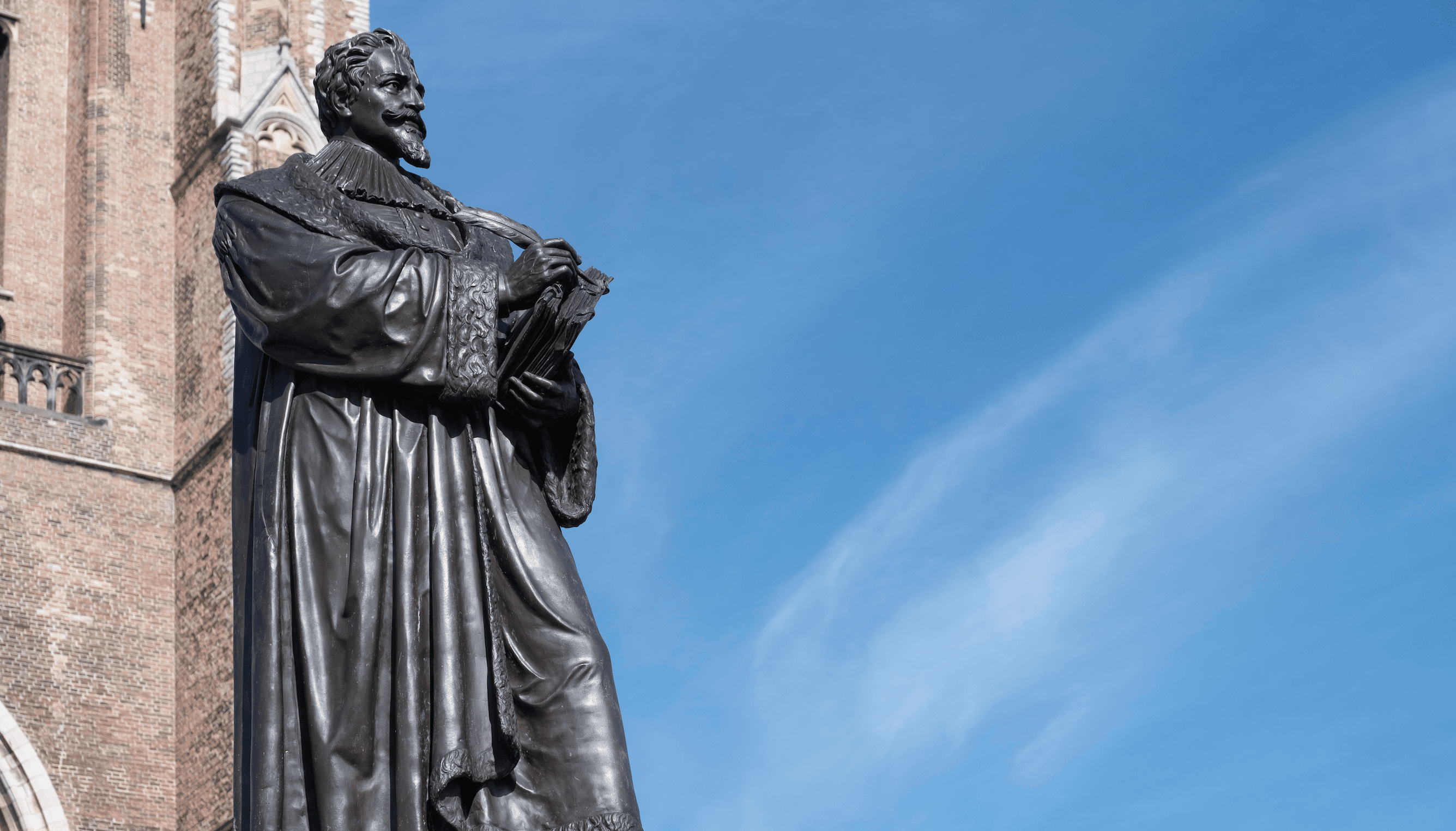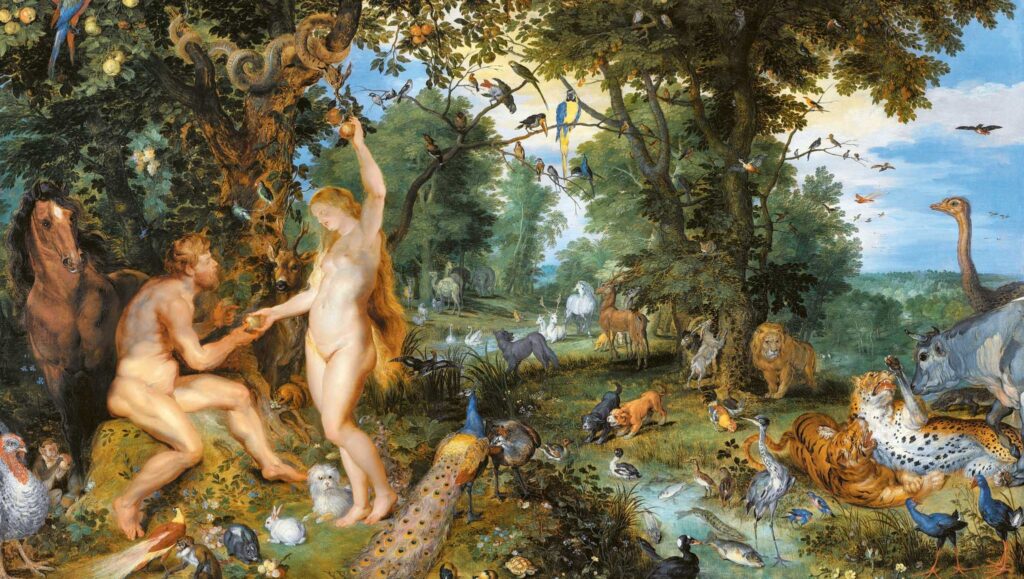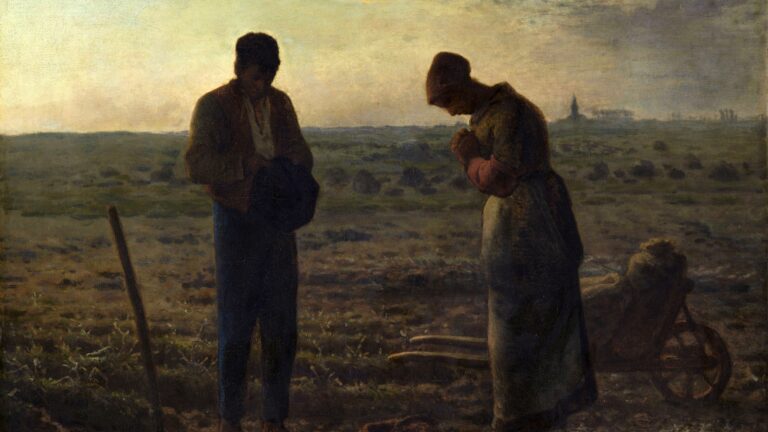In the previous publication The Roots of Today’s Secular Individualism, it was stated that the Dutch scholar and jurist Hugo de Groot, better known as Hugo Grotius (1538–1645), the ‘Father of Modern Natural Law’, remoulded the universally held concept of natural law—the law of God written in the heart of man. It was his belief that the law of nature would still exist etiamsi daremus Deum non esse (even if we were to say there is no God). While Grotius had the best of intentions, specifically to invite the then-body politic to propagate just laws that would ensure peace in society, he inadvertently paved the way for the atheistic philosophy of the Enlightenment and today’s effective altruism that has reduced the human person to a mere statistic.
Grotius, an Arminian Calvinist, never refuted the existence of God, but wanted to dispel the belief, which emerged when John Calvin’s teachings became prevalent, in the tenet that God only renders justice by an ‘absolute decree’, which in turn left no room for free will. In fact, Grotius’s religious writings emphasised that the truths of Christianity, which were held in common by Catholics, Calvinists, Lutherans, and Arminians, were fundamentally more important than the peripheral points on which they felt they differed. Hence, it was no longer going to be ‘the law of God’ written in man’s heart that would guide him to make the morally correct decisions. Instead, man’s reason alone—independent from the divine precepts—was to determine what was ethically sound and what was not.
Grotius’s Vision
Being well-acquainted with the natural law tenets of his time, Grotius’s eclectic method drew from various sources, such as Plato, Aristotle, the Church Fathers and the medieval scholastics as he composed the Prolegomena of his ‘De Iure Belli ac Pacis’ (Right to War and Peace). He was set apart from his contemporaries for his ‘transition from the metaphysical to the rationalist natural law’[1] when he included both natural and positive laws in his proposition of international law.
Unlike Aristotle, who sought to provide political solutions to the city-states, Grotius sought to furnish a peaceful resolution to the wars that the Christian absolute monarch-states were carrying out among themselves. This was parallel to the Dominican friar Francisco de Vitoria (1483–1546), considered the Father of international law, whose point of departure upheld the idea of a universal and immutable law of nature (ius naturale) based upon right reason and human sociability—a philosophical conception derived from the Stoic philosophers.
Grotius believed that since man had the right to travel and trade freely, States also had the right to free trade. As exposed in his Mare liberum, 1609 (The Freedom of the Seas), he refuted the commonly held opinion of monarchies that seas could become state property. In fact, no government had the right to exclude other nations‘ merchant ships from any seas. He was adament about the ‘principle of “responsibility to protect”…by those in government with regard to the governed…as an aspect of natural reason shared by all nations’.
What Grotius essentially developed was a theological basis not for politics but for economics, and not for philosophical, but practical reasons: to prevent the economic exploitation of the underprivileged. He broke away from the traditional appeal to Sacred Scripture, and relied upon tenets of justice based on natural law according to human reason.
Grotius’s Concept of the Natural Law
Grotius’s revolutionary concept of natural law is based on two points. First, he rejected the concept of sola gratia of the Protestant Reformation, as well as that of medieval Voluntarism; the latter presented morality as subject to individual will or judgment, such as the arbitrary command of a tyrant. In his mind, if either were the case, who could then know the basis of morality, and in what sense could one say that it is universally applied? Consequently, Grotius placed emphasis on man having complete freedom to discern for himself the law of nature, even if there were to be no God.
Natural law, Grotius sustained, is the basis of natural rights:
‘Civilians call a faculty that Right, which every man has to his own…This right comprehends the power, that we have over ourselves, which is called liberty…It likewise comprehends property…Now any thing is unjust, which is repugnant to the nature of society, established among rational creatures. Thus for instance, to deprive another of what belongs to him, merely for one’s own advantage, is repugnant to the law of nature.’
Grotius’s primary concern was the conservation of international order and the respect for sovereignty, unless a tyrant committed atrocities against his subjects
Yet Grotius’s primary concern, as already indicated, was the conservation of international order and the respect for sovereignty, unless a tyrant committed atrocities against his subjects. In this case, although he did not specifically advocate for the intervention of a foreign state to enforce peace, he suggested that if it would restore peace and order, then it was permissible. The purpose, however, of interposition of one state in the affairs of another, was not to protect the victimised people, rather to punish the tyrant ruler. Since he held that within the structure of natural law, there was sufficient room for considerations of utility, which can very well change from people to people and which can enforce certain disciplines, any violation of which would justify intervention. Some of these principles, which establish varying levels of municipal law, are to be universal and immutable. In this view, Grotius defined law of nature, i.e., natural law (‘ius naturale’) as
‘…a dictate of right reason, which points out that an act, according [to or not] in conformity with rational [and social] nature, has in it a quality of moral baseness or moral necessity; and that, in consequence, such an act is either forbidden or conjoined by the author of nature, God.’[2]
Grotius’s exposition of ‘moral necessity’ as a substantial quality of natural law, in effect, exposes that he personally had no doubt in the existence of God as author of the law of nature. Yet because he maintained that natural law was immutable, God was not capable of changing it since the law of nature would enjoin exactly the same if, by hypothesis, there were no God. Grotius argues ‘just as even God, then, cannot cause that two times two should not make four, so He cannot cause that that which is intrinsically evil be not evil’.[3] In this sense, the classical attribute that God cannot contradict himself was altered to a God who is confined by His own nature.
Grotius’s Legacy
It must be noted that Grotius is not referring to natural law as a set of legislative norms. Hence, binding its concept as natural acknowledges that natural law does stem from God, even though it must be nurtured by humanity. His contributions helped develop the notion of law as regulating the rapport among independent and sovereign states, which had become increasingly more chaotic, especially in light of the rise of absolute monarchies, who recognised no authority above or beyond themselves, subsequently claiming their divine right to rule and exploit the populace in their colonies.
Let us keep in mind that, as Benedict XVI stated in his ‘Address to the Bundestag’ in 2011, Christianity ‘has never proposed a revealed law to the State and to society, that is to say a juridical order derived from revelation,’ unlike other religions or as the absolute states during the sixteenth to the seventeenth centuries had claimed. Grotius did not seek to develop or invent a new concept of the natural law, but rather in using an arbitrary compilation he tried to reate in a ‘comprehensive and systematic manner’ a universal standard that would incorporate all legal rules given to ‘mankind’ for its ‘welfare’ by human nature or ‘divine ordinance’.
And Grotius was certainly not trying to speak for the Christian faith of the time, but was instead seeking to present a global point of reference that would be based on the laws of nature. Nevertheless, it would be his reformulation of the traditional understanding of natural law, specifically that it would still exist etiamsi daremus Deum non esse, that would set him apart from previous political philosophers. He was to become the inspiration from men like Samuel von Pufendorf (1632–1694) and Jean-Jacques Rousseau (1712–1778) who would exploit the notion of etiamsi daremus Deum non esse and eschew any appeal to God or His divine mandates as a point of reference for the welfare of society and the individual person.
[1] Heinrich Romnen, The Natural Law: A Study in Legal and Social History and Philosophy (Indianapolis: Liberty Fund, 1998), 62.
[2] Hugo Grotius, De iure belli ac pacis, (Darmstadt: cur. B. J. A. D. Kanter – Van Hettinga Tromp, Liber I., 1993), 34.
[3] Grotius, De iure belli ac pacis, 5.







